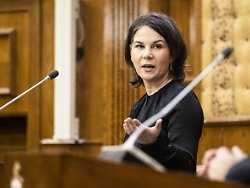Minister visits Amman
Baerbock wants more refugee aid for Jordan
2/11/2022, 4:56 p.m
On her trip to the Middle East, the German Foreign Minister met her Jordanian counterpart. Both are convinced that only a two-state solution can ensure peace in the Middle East. Baerbock urges more international aid for Palestinian refugees – and also comments on the Ukraine conflict.
In the words of Federal Foreign Minister Annalena Baerbock, there is still a “very long and rocky” road ahead of everyone involved in the Middle East peace process. For the federal government, this does not mean “that we are not ready to get going,” she said at a joint press conference with her Jordanian colleague Ayman Safadi in Amman.
Together with partners like Jordan, Germany will “explore which formats we can continue,” said Baerbock. Like Safadi, the Foreign Minister again emphasized during her visit to Jordan that “the peaceful solution” to the Middle East conflict “must and should be a two-state solution”. The two-state solution means the formation of a democratic and independent Palestinian state that exists peacefully alongside Israel. Germany is playing a key role in the mobilization to bring Israel and the Palestinians back to the negotiating table, stressed Jordan’s foreign minister.
“The situation of the Palestinians also plays an incredibly important role,” said Baerbock. In this context, the minister appealed to the international community to increase financial aid for Palestinian refugees. “Especially in times when security policy tensions are increasing and when we are confronted with a pandemic at the same time”, it is important “that international financial aid is there and is being further expanded”.
Germany provided 150 million euros last year through the UN Agency for Palestinian Refugees (UNRWA). “We will continue to do this in the future,” she said. Before meeting Safadi, Baerbock had visited the UNRWA refugee camp in Talbieh, 35 kilometers south of the capital Amman, which Germany supports significantly.
UNRWA laments “budget deficits”
The school closures during the corona pandemic made it difficult for the children in the refugee camp, Baerbock reported afterwards on Instagram. Almost half of the Palestinian refugees are children. The minister praised Jordan’s “enormous humanitarian contribution”, which is one of the most important receiving countries for refugees from the region.
In January, UNRWA issued an urgent appeal for funding commitments of $1.6 billion (€1.4 billion). “Chronic budget deficits” are a “serious threat” to the maintenance of the aid program, said the head of the aid organization, Philippe Lazzarini.
During her visit to Jordan, Baerbock also addressed tensions between Russia and NATO. The Foreign Minister sees “no signs of de-escalation” in the Ukraine crisis, at least in military terms. The situation is “incredibly tense,” said Baerbock. Despite the talks with Kiev and Moscow in the Normandy format, the Russian troop build-up on the border with Ukraine is continuing.
“And Russia has now also announced that it will withdraw its diplomats from Ukraine,” the Foreign Minister continued. “That’s why we are preparing for all scenarios, as we have been in the past few weeks.” According to Western sources, Russia has massed more than 100,000 soldiers on the border with Ukraine in recent months. In Ukraine, as in the West, this is fueling fears of a major Russian attack on the neighboring country. Russia rejects any plans of attack. At the same time, the Kremlin states that it feels threatened by NATO.
Reports on Russian maneuvers
In the past few days, Moscow had increased the pressure. Military exercises involving tens of thousands of Russian soldiers began in Belarus on Thursday. According to the Defense Ministry, a naval maneuver took place in the Black Sea. In the Rostov region, which borders Ukraine, 400 soldiers also took part in a “tactical exercise” for a “combat mission”.
A first round of talks in the so-called Normandy format has not brought any tangible progress for a long time. According to Baerbock, the foreign policy advisers of Russia and Ukraine as well as Germany and France as mediators lasted more than ten hours and were “difficult”. She positively emphasized that all participants “do not want to let the thread break” and that a new meeting in March had been agreed.
The Foreign Minister is currently on a multi-day trip to the Middle East. After meetings with Israeli Foreign Minister Jair Lapid, Israeli Prime Minister Naftali Bennett, Palestinian President Mahmoud Abbas and Palestinian Foreign Minister Riyad al-Maliki, their last stop on Saturday will be Egypt.
